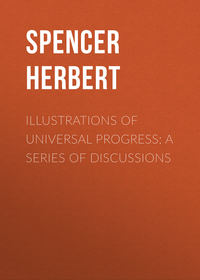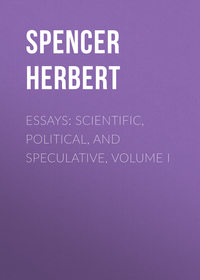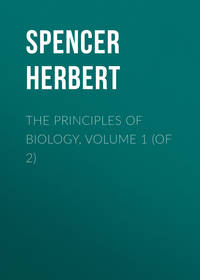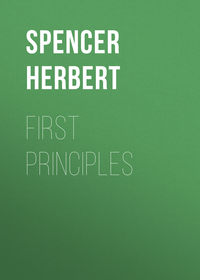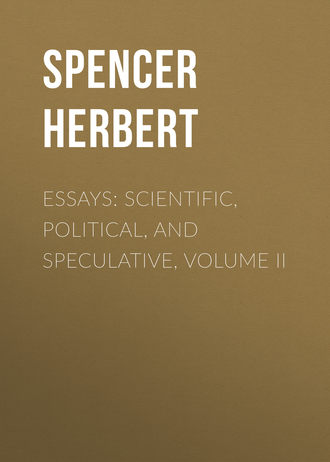
Essays: Scientific, Political, and Speculative, Volume II
Now, the hypothesis which we have hinted above, is that, beyond the direct pleasure which it gives, music has the indirect effect of developing this language of the emotions. Having its root, as we have endeavoured to show, in those tones, intervals, and cadences of speech which express feeling – arising by the combination and intensifying of these, and coming finally to have an embodiment of its own; music has all along been reacting upon speech, and increasing its power of rendering emotion. The use in recitative and song of inflections more expressive than ordinary ones, must from the beginning have tended to develope the ordinary ones. The complex musical phrases by which composers have conveyed complex emotions, may rationally be supposed to influence us in making those involved cadences of conversation by which we convey our subtler thoughts and feelings. If the cultivation of music has any effect on the mind, what more natural effect is there than this of developing our perception of the meanings of qualities, and modulations of voice; and giving us a correspondingly increased power of using them? Just as chemistry, arising out of the processes of metallurgy and the industrial arts, and gradually growing into an independent study, has now become an aid to all kinds of production – just as physiology, originating from medicine and once subordinate to it, but latterly pursued for its own sake, is in our day coming to be the science on which the progress of medicine depends; – so, music, having its root in emotional language, and gradually evolved from it, has ever been reacting upon and further advancing it.
It will scarcely be expected that much direct evidence in support of this conclusion can be given. The facts are of a kind which it is difficult to measure, and of which we have no records. Some suggestive traits, however, are to be noted. May we not say, for instance, that the Italians, among whom modern music was earliest cultivated, and who have more especially excelled in melody (the division of music with which our argument is chiefly concerned) – may we not say that these Italians speak in more varied and expressive inflections and cadences than any other people? On the other hand, may we not say that, confined almost exclusively as they have hitherto been to their national airs, and therefore accustomed to but a limited range of musical expression, the Scotch are unusually monotonous in the intervals and modulations of their speech? And again, do we not find among different classes of the same nation, differences that have like implications? The gentleman and the clown stand in decided contrast with respect to variety of intonation. Listen to the conversation of a servant-girl, and then to that of a refined lady, and the more delicate and complex changes of voice used by the latter will be conspicuous. Now, without going so far as to say that out of all the differences of culture to which the upper and lower classes are subjected, difference of musical culture is that to which alone this difference of speech is ascribable; yet we may fairly say that there seems a much more obvious connexion of cause and effect between these than between any others. Thus, while the inductive evidence to which we can appeal is but scanty and vague, yet what there is favours our position.
Probably most will think that the function here assigned to music is one of very little moment. But reflection may lead them to a contrary conviction. In its bearings upon human happiness, this emotional language which musical culture develops and refines, is only second in importance to the language of the intellect; perhaps not even second to it. For these modifications of voice produced by feelings, are the means of exciting like feelings in others. Joined with gestures and expressions of face, they give life to the otherwise dead words in which the intellect utters its ideas; and so enable the hearer not only to understand the state of mind they accompany, but to partake of that state. In short, they are the chief media of sympathy. And if we consider how much both our general welfare and our immediate pleasures depend on sympathy, we shall recognize the importance of whatever makes this sympathy greater. If we bear in mind that by their fellow-feeling men are led to behave justly and kindly to one another – that the difference between the cruelty of the barbarous and the humanity of the civilized, results from the increase of fellow-feeling; if we bear in mind that this faculty which makes us sharers in the joys and sorrows of others, is the basis of all the higher affections; if we bear in mind how much our direct gratifications are intensified by sympathy, – how, at the theatre, the concert, the picture gallery, we lose half our enjoyment if we have no one to enjoy with us; – we shall see that the agencies which communicate it can scarcely be overrated in value. The tendency of civilization is to repress the antagonistic elements of our characters and to develope the social ones – to curb our purely selfish desires and exercise our unselfish ones – to replace private gratifications by gratifications resulting from, or involving, the pleasures of others. And while, by this adaptation to the social state, the sympathetic side of our nature is being unfolded, there is simultaneously growing up a language of sympathetic intercourse – a language through which we communicate to others the happiness we feel, and are made sharers in their happiness. This double process, of which the effects are already appreciable, must go on to an extent of which we can as yet have no adequate conception. The habitual concealment of our feelings diminishing, as it must, in proportion as our feelings become such as do not demand concealment, the exhibition of them will become more vivid than we now dare allow it to be; and this implies a more expressive emotional language. At the same time, feelings of higher and more complex kinds, as yet experienced only by the cultivated few, will become general; and there will be a corresponding development of the emotional language into more involved forms. Just as there has silently grown up a language of ideas, which, rude as it at first was, now enables us to convey with precision the most subtle and complicated thoughts; so, there is still silently growing up a language of feelings, which, notwithstanding its present imperfection, we may expect will ultimately enable men vividly and completely to impress on each other the emotions which they experience from moment to moment.
Thus if, as we have endeavoured to show, it is the function of music to facilitate the development of this emotional language, we may regard music as an aid to the achievement of that higher happiness which it indistinctly shadows forth. Those vague feelings of unexperienced felicity which music arouses – those indefinite impressions of an unknown ideal life which it calls up, may be considered as a prophecy, the fulfilment of which music itself aids. The strange capacity which we have for being affected by melody and harmony, may be taken to imply both that it is within the possibilities of our nature to realize those intenser delights they dimly suggest, and that they are in some way concerned in the realization of them. If so the power and the meaning of music become comprehensible; but otherwise they are a mystery.
We will only add that, if the probability of these corollaries be admitted, then music must take rank as the highest of the fine arts – as the one which, more than any other, ministers to human welfare. And thus, even leaving out of view the immediate gratifications it is hourly giving, we cannot too much applaud that musical culture which is becoming one of the characteristics of our age.
POSTSCRIPT
An opponent, or partial opponent, of high authority, whose views were published some fourteen years after the above essay, must here be answered: I mean Mr. Darwin. Diligent and careful as an observer beyond naturalists in general, and still more beyond those who are untrained in research, his judgment on a question which must be decided by induction is one to be received with great respect. I think, however, examination will show that in this instance Mr. Darwin’s observations are inadequate, and his reasonings upon them inconclusive. Swayed by his doctrine of sexual selection, he has leaned towards the view that music had its origin in the expression of amatory feeling, and has been led to over-estimate such evidence as he thinks favours that view, while ignoring the difficulties in its way, and the large amount of evidence supporting another view. Before considering the special reasons for dissenting from his hypothesis, let us look at the most general reasons.
The interpretation of music which Mr. Darwin gives, agrees with my own in supposing music to be developed from vocal noises; but differs in supposing a particular class of vocal noises to have originated it – the amatory class. I have aimed to show that music has its germs in the sounds which the voice emits under excitement, and eventually gains this or that character according to the kind of excitement; whereas Mr. Darwin argues that music arises from those sounds which the male makes during the excitements of courtship, that they are consciously made to charm the female, and that from the resulting combinations of sounds arise not love-music only but music in general. That certain tones of voice and cadences having some likeness of nature are spontaneously used to express grief, others to express joy, others to express affection, and others to express triumph or martial ardour, is undeniable. According to the view I have set forth, the whole body of these vocal manifestations of emotion form the root of music. According to Mr. Darwin’s view, the sounds which are prompted by the amatory feeling only, having originated musical utterance, there are derived from these all the other varieties of musical utterance which aim to express other kinds of feeling. This roundabout derivation has, I think, less probability than the direct derivation.
This antithesis and its implications will perhaps be more clearly understood on looking at the facts under their nervo-muscular aspect. Mr. Darwin recognizes the truth of the doctrine with which the foregoing essay sets out, that feeling discharges itself in action: saying of the air-breathing vertebrata that —
“When the primeval members of this class were strongly excited and their muscles violently contracted, purposeless sounds would almost certainly have been produced; and these, if they proved in any way serviceable, might readily have been modified or intensified by the preservation of properly adapted variations.” ( The Descent of Man , vol. ii., p. 331.)
But though this passage recognizes the general relation between feelings and those muscular contractions which cause sounds, it does so inadequately; since it ignores, on the one hand, those loudest sounds which accompany intense sensations – the shrieks and groans of bodily agony; while, on the other hand, it ignores those multitudinous sounds not produced “under the excitement of love, rage, and jealousy,” but which accompany ordinary amounts of feelings, various in their kinds. And it is because he does not bear in mind how large a proportion of vocal noises are caused by other excitements, that Mr. Darwin thinks “a strong case can be made out, that the vocal organs were primarily used and perfected in relation to the propagation of the species” (p. 330).
Certainly the animals around us yield but few facts countenancing his view. The cooing of pigeons may, indeed, be named in its support; and it may be contended that caterwauling furnishes evidence; though I doubt whether the sounds are made by the male to charm the female. But the howling of dogs has no relation to sexual excitements; nor has their barking, which is used to express emotion of almost any kind. Pigs grunt sometimes through pleasurable expectation, sometimes during the gratifications of eating, sometimes from a general content while seeking about for food. The bleatings of sheep, again, occur under the promptings of various feelings, usually of no great intensity: social and maternal rather than sexual. The like holds with the lowing of cattle. Nor is it otherwise with poultry. The quacking of ducks indicates general satisfaction, and the screams occasionally vented by a flock of geese seem rather to express a wave of social excitement than anything else. Save after laying an egg, when the sounds have the character of triumph, the cluckings of a hen show content; and on various occasions cock-crowing apparently implies good spirits only. In all cases an overflow of nervous energy has to find vent; and while in some cases it leads to wagging of the tail, in others it leads to contraction of the vocal muscles. That this relation holds, not of one kind of feeling, but of many kinds, is a truth which seems to me at variance with the view “that the vocal organs were primarily used and perfected in relation to the propagation of the species.”
The hypothesis that music had its origin in the amatory sounds made by the male to charm the female, has the support of the popular idea that the singing of birds constitutes a kind of courtship – an idea adopted by Mr. Darwin when he says that “the male pours forth his full volume of song, in rivalry with other males, for the sake of captivating the female.” Usually, Mr. Darwin does not accept without criticism and verification, the beliefs he finds current; but in this case he seems to have done so. Even cursory observation suffices to dissipate this belief, initiated, I suppose, by poets. In preparation for dealing with the matter I have made memoranda concerning various songbirds, dating back to 1883. On the 7th of February of that year I heard a lark singing several times; and, still more remarkably, during the mild winter of 1884 I saw one soar, and heard it sing, on the 10th January. Yet the lark does not pair till March. Having heard the redbreast near the close of August, 1888, I noted the continuance of its song all through the autumn and winter, up to Christmas eve, Christmas day, the 29th of December, and again on the 18th January, 1889. How common is the singing of the thrush during mild weather in winter, everyone must have observed. The presence of thrushes behind my house has led to the making of notes on this point. The male sang in November, 1889; I noted the song again on Christmas eve, again on the 13th January, 1890, and from time to time all through the rest of that month. I heard little of his song in February, which is the pairing season; and none at all, save a few notes early in the morning, during the period of rearing the young. But now that, in the middle of May, the young, reared in a nest in my garden, have sometime since flown, he has recommenced singing vociferously at intervals throughout the day; and doubtless, in conformity with what I have observed elsewhere, will go on singing till July. How marked is the direct relation between singing and the conditions which cause high spirits, is perhaps best shown by a fact I noted on the 4th December, 1888, when, the day being not only mild but bright, the copses on Holmwood Common, Dorking, were vocal just as on a spring day, with a chorus of birds of various kinds – robins, thrushes, chaffinches, linnets, and sundry others of which I did not know the names. Ornithological works furnish verifying statements. Wood states that the hedge-sparrow continues “to sing throughout a large portion of the year, and only ceasing during the time of the ordinary moult.” The song of the blackcap, he says, “is hardly suspended throughout the year;” and of caged birds which sing continuously, save when moulting, he names the grosbeak, the linnet, the goldfinch, and the siskin.
I think these facts show that the popular idea adopted by Mr. Darwin is untenable. What then is the true interpretation? Simply that like the whistling and humming of tunes by boys and men, the singing of birds results from overflow of energy – an overflow which in both cases ceases under depressing conditions. The relation between courtship and singing, so far as it can be shown to hold, is not a relation of cause and effect, but a relation of concomitance: the two are simultaneous results of the same cause. Throughout the animal kingdom at large, the commencement of reproduction is associated with an excess of those absorbed materials needful for self-maintenance; and with a consequent ability to devote a part to the maintenance of the species. This constitutional state is one with which there goes a tendency to superfluous expenditure in various forms of action – unusual vivacity of every kind, including vocal vivacity. While we thus see why pairing and singing come to be associated, we also see why there is singing at other times when the feeding and weather are favourable; and why, in some cases, as in those of the thrush and the robin, there is more singing after the breeding season than before or during the breeding season. We are shown, too, why these birds, and especially the thrush, so often sing in the winter: the supply of worms on lawns and in gardens being habitually utilized by both, and thrushes having the further advantage that they are strong enough to break the shells of the hybernating snails: this last ability being connected with the fact that thrushes and blackbirds are the first among the singing birds to build. It remains only to add that the alleged singing of males against one another with the view of charming the females is open to parallel criticisms. How far this competition happens during the pairing season I have not observed, but it certainly happens out of the pairing season. I have several times heard blackbirds singing alternately in June. But the most conspicuous instance is supplied by the redbreasts. These habitually sing against one another during the autumn months: reply and rejoinder being commonly continued for five minutes at a time.
Even did the evidence support the popular view, adopted by Mr. Darwin, that the singing of birds is a kind of courtship – even were there good proof, instead of much disproof, that a bird’s song is a developed form of the sexual sounds made by the male to charm the female; the conclusion would, I think, do little towards justifying the belief that human music has had a kindred origin. For, in the first place, the bird-type in general, developed as it is out of the reptilian type, is very remotely related to that type of the Vertebrata which ascends to Man as its highest exemplar; and, in the second place, song-birds belong, with but few exceptions, to the single order of Insessores – one order only, of the many orders constituting the class. So that, if the Vertebrata at large be represented by a tree, of which Man is the topmost twig, then it is at a considerable distance down the trunk that there diverges the branch from which the bird-type is derived; and the group of singing-birds forms but a terminal sub-division of this branch – lies far out of the ascending line which ends in Man. To give appreciable support to Mr. Darwin’s view, we ought to find vocal manifestations of the amatory feeling becoming more pronounced as we ascend along that particular line of inferior Vertebrata out of which Man has arisen. Just as we find other traits which pre-figure human traits (instance arms and hands adapted for grasping) becoming more marked as we approach Man; so should we find, becoming more marked, this sexual use of the voice, which is supposed to end in human song. But we do not find this. The South-American monkeys (“the Howlers,” as they are sometimes called), which, in chorus, make the woods resound for hours together with their “dreadful concert,” appear, according to Rengger, to be prompted by no other desire than that of making a noise. Mr. Darwin admits, too, that this is generally the case with the gibbons: the only exception he is inclined to make being in the case of Hylobates agilis , which, on the testimony of Mr. Waterhouse, he says ascends and descends the scale by half-tones. 54 This comparatively musical set of sounds, he thinks, may be used to charm the female; though there is no evidence forthcoming that this is the case. When we remember that in the forms nearest to the human – the chimpanzees and the gorilla – there is nothing which approaches even thus far towards musical utterance, we see that the hypothesis has next to none of that support which ought to be forthcoming. Indeed in his Descent of Man , vol. ii., p. 332, Mr. Darwin himself says: – “It is a surprising fact that we have not as yet any good evidence that these organs are used by male mammals to charm the females:” an admission which amounts to something like a surrender.
Even more marked is the absence of proof when we come to the human race itself – or rather, not absence of proof but presence of disproof. Here, from the Descriptive Sociology , where the authorities will be found under the respective heads, I quote a number of testimonies of travellers concerning primitive music: commencing with those referring to the lowest races.
“The songs of the natives [of Australia].. are chiefly made on the spur of the moment, and refer to something that has struck the attention at the time.” “The Watchandies seeing me much interested in the genus Eucalyptus soon composed a song on this subject.” The Fuegians are fond of music and generally sing in their boats, doubtless keeping time, as many primitive peoples do. “The principal subject of the songs of the Araucanians is the exploits of their heroes:” when at work their “song was simple, referring mostly to their labour,” and was the same “for every occasion, whether the burden of the song be joy or sorrow.” The Greenlanders sing of “their exploits in the chase” and “chant the deeds of their ancestors.” “The Indians of the Upper Mississippi vocalize an incident, as – ‘They have brought us a fat dog,’:” then the chorus goes on for a minute. Of other North-American Indians we read – “the air which the women sang was pleasing.. the men first gave out the words, which formed a consummate glorification of themselves.” Among the Carriers (of North America) there are professed composers, who “turn their talent to good account on the occasion of a feast, when new airs are in great request.” Of the New Zealanders we read: – “The singing of such compositions [laments] resembles cathedral chanting.” “Passing events are described by extemporaneous songs, which are preserved when good.” “When men worked together appropriate airs were sung.” When presenting a meal to travellers, women would chant – “What shall be our food? shell fish and fern-root, that is the root of the earth.” Among the Sandwich Islanders “most of the traditions of remarkable events in their history are preserved in songs.” When taught reading they could not “recite a lesson without chanting or singing it.” Cook found the Tahitians had itinerant musicians who gave narrative chants quite unpremeditated. “A Samoan can hardly put his paddle in the water without striking up some chant.” A chief of the Kyans, “Tamawan, jumped up and while standing burst out into an extempore song, in which Sir James Brooke and myself, and last not least the wonderful steamer, was mentioned with warm eulogies.” In East Africa “the fisherman will accompany his paddle, the porter his trudge, and the housewife her task of rubbing down grain, with song.” In singing, the East African “contents himself with improvising a few words without sense or rhyme and repeats them till they nauseate,” Among the Dahomans any incident “from the arrival of a stranger to an earthquake” is turned into a song. When rowing, the Coast-negroes sing “either a description of some love intrigue or the praise of some woman celebrated for her beauty.” In Loango “the women as they till the field make it echo with their rustic songs.” Park says of the Bambarran – “they lightened their labours by songs, one of which was composed extempore; for I was myself the subject of it.” “In some parts of Africa nothing is done except to the sound of music.” “They are very expert in adapting the subjects of these songs to current events.” The Malays “amuse all their leisure hours.. with the repetition of songs, which are for the most part proverbs illustrated… Some that they rehearse in a kind of recitative at their bimbangs or feasts are historical love-tales.” A Sumatran maiden will sometimes begin a tender song and be answered by one of the young men. The ballads of the Kamtschadales are “inspired apparently by grief, love, or domestic feeling;” and their music conveys “a sensation of sorrow and vague, unavailing regret.” Of their love-songs it is said “the women generally compose them.” A Kirghiz “singer sits on one knee and sings in an unnatural tone of voice, his lay being usually of an amorous character.” Of the Yakuts we are told “their style of singing is monotonous.. their songs described the beauty of the landscape in terms which appeared to me exaggerated.”


